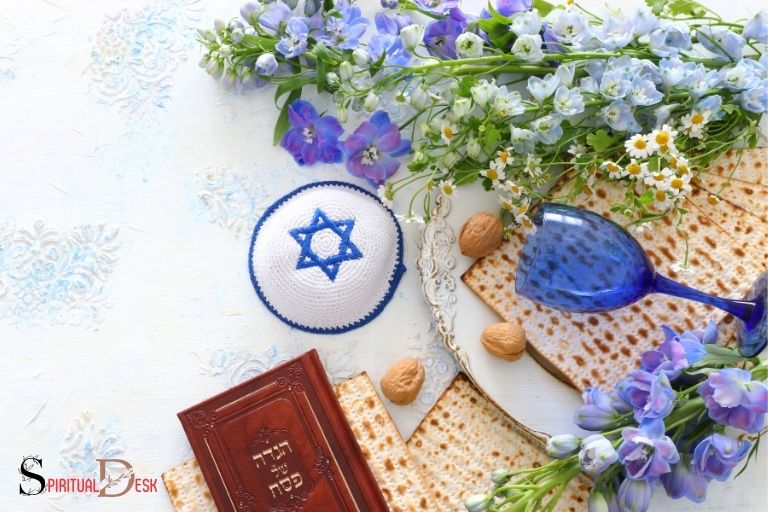What is the Spiritual Meaning of Passover? Freedom!
The spiritual meaning of Passover is the celebration of freedom from spiritual bondage and the renewal of one’s relationship with God.
Passover, also known as Pesach, is a Jewish holiday that commemorates the Israelites’ liberation from slavery in ancient Egypt. It signifies not only physical emancipation but also spiritual freedom and growth.
The spiritual aspect of Passover is deeply rooted in Jewish teachings and is seen as an opportunity for individuals to strengthen their faith, deepen their understanding of their heritage, and reconnect with God.
During Passover, various rituals, such as the Seder meal and the retelling of the Exodus story, help individuals to reflect on their personal spiritual journey and draw inspiration from the Israelites’ perseverance and faith in God.
They are also reminded to practice empathy and compassion towards others, as they recall the hardships their ancestors endured.
Through these spiritual observances, participants are encouraged to renew their commitment to God and strive for continued growth and progress on their spiritual path.
10 Aspects: Spiritual Meaning of Passover
| Aspect of Passover | Spiritual Meaning |
|---|---|
| Exodus from Egypt | Symbolizes liberation from spiritual bondage and the journey towards freedom and spiritual growth. |
| Passover Seder | A step-by-step process that represents stages of personal transformation and spiritual awakening. |
| Matzah (unleavened bread) | Symbolizes humility and the shedding of ego, freeing oneself from spiritual constraints. |
| Four Cups of Wine | Represent the four expressions of divine redemption and the different levels of spiritual freedom. |
| Maror (bitter herbs) | A reminder of the bitterness of spiritual enslavement and the need to overcome adversity and challenges in order to grow. |
| Haggadah (text recited during the Seder) | Tells the story of physical and spiritual redemption, emphasizing the importance of gratitude and passing on the legacy of faith. |
| The Ten Plagues | Divine intervention and the power of transformation in one’s spiritual journey. |
| Afikoman (hidden matzah) | A symbol of the innermost aspect of the soul, representing the connection between spirituality and physicality. |
| The Four Questions | Encourage curiosity and the pursuit of spiritual knowledge and personal growth. |
| The Four Sons | Represent different attitudes and levels of spiritual growth, emphasizing the importance of teaching and guidance in one’s spiritual journey. |
Key Takeaway

Five Facts About: Spiritual Meaning Of Passover
Understanding Passover: An Introduction
Passover is a significant holiday in the jewish faith, marking the liberation of enslaved jewish people from the oppressive grips of pharaoh in ancient egypt.
The observance of passover is not only a commemoration of the past but also a celebration of jewish identity and traditions.
Overview Of Passover Celebrations And Traditions
The passover celebrations typically last for eight days, characterized by a range of rituals and traditions.
Below is an overview of the passover celebrations and traditions:
- The ritual of seder: A 15-step ritual that involves retelling the story of the exodus from egypt, eating matzah and other symbolic foods, drinking four cups of wine and generally celebrating the journey from slavery to freedom.
- Cleaning of the home: Before the passover, jewish people are required to rid their homes of all chametz (leavened food)
- The consumption of unleavened bread (matzah): Jews are required to consume matzah, symbolizing the unleavened bread that the hebrew slaves ate during their hurried escape from egypt.
- Celebration of the haggadah: This is a text-dense book read during the seder meal, featuring prayers, songs, and stories.
Brief Historical Background Leading Up To Modern-Day Passover
The passover has its roots in ancient egypt, where the hebrew slaves suffered the cruelty of pharaoh’s enslavement.
According to the book of exodus, moses, the hebrew prophet, received a call from god to deliver his people from slavery.
After a series of harrowing events, including the ten plagues and the parting of the red sea, the hebrew slaves were finally freed from captivity.
The passover is a commemoration of that significant event in jewish history.
Some of the practices linked to passover harken back to the days of biblical israel. For instance, the eating of matzah may have existed before the exodus but became symbolic of it since the unleavened bread was what the israelites ate after they were freed from egypt.
Explanation Of The Spiritual Significance Of Passover
Beyond the historical events, the passover is rich in spiritual significance and symbolism.
Some of the important spiritual meanings of passover include:
- Remembrance: The passover is a time to remember the trials and tribulations of the israelites and how they were liberated from the tyranny of pharaoh.
- Gratitude: The passover is also a time to be thankful for freedom, the gift of life, and for all the other blessings that we have in our lives.
- Redemption: Passover symbolizes the hope of redemption, reminding jewish people of god’s saving power and his continuing role in their lives.
- Unity: The passover is a chance for jews to come together with their families and communities, retell their stories, and celebrate their heritage as a people.
Passover is a time when jewish people come together to celebrate their history, traditions, and faith.
The passover holiday is characterized by numerous rituals, each symbolizing the journey from slavery to freedom.
Beyond the historical significance, passover offers many spiritual meanings, including remembrance, gratitude, redemption, and unity, which are all important to jews across the globe.
Examining The Meaning Of Passover In Judaism
Passover is a significant festival in judaism, celebrated in early spring to commemorate the release of israelites from slavery in egypt.
Passover is not just a one-day celebration but a week-long period of reflection and spiritual renewal, marked by special prayers, traditional meals, and religious observances.
Definition Of Passover In Jewish Culture
Passover, also known as pesach, is the holiday that celebrates the freeing of the israelites from slavery in egypt.
In hebrew, the word ‘pesach’ means �to pass over,’ which signifies the passing over of the homes of the jewish people during the tenth plague, where the firstborn sons of the egyptians were killed.
The holiday is celebrated for a week and carries great spiritual and historical significance for the jewish community.
The Origin Of Passover In The Book Of Exodus
The basis of the passover story is in the book of exodus, which describes the journey of the israelites out of egypt. It tells the story of how moses confronted pharaoh and demanded the release of the israelites from slavery.
Pharaoh refused, and ten plagues were sent to egypt, including the famous tenth plague, the killing of firstborn.
The israelites were spared of this plague as they marked their doorposts with the blood of a sacrificed lamb, which led to their freedom from slavery.
The Symbolism Of Passover In Judaism
Passover celebrates the freedom of the israelites from oppression and bondage. During the passover seder, the participants retell the story of the exodus and eat food items, such as matzah and bitter herbs, which have symbolic meanings.
Matzah, an unleavened bread, which has no yeast or additives, represents speedy departure.
Bitter herbs represent the bitterness of slavery. They also partake in eating symbolic foods and drinking four cups of wine, which represent the four types of redemption.
The Spiritual Message Of Passover In Jewish Culture And Belief
Passover has a deeper spiritual meaning for people of jewish faith. It is a reminder of their ancestors’ struggle for freedom and their unwavering faith in god.
The holiday is a time for personal and spiritual liberation, a call to introspection and self-awareness, and a connection to the divine.
It is a time to let go of the burdens that hold us back from personal growth and to look forward to the future with hope and optimism.
Passover is a holiday that commemorates the release of the israelites from the bondage of slavery. It carries significant historical and spiritual significance, reminding the jewish community of their faith and traditions.
Through the retelling of the story of exodus, they are reminded of their call to freedom and their unwavering faith in god.
May the celebration of passover continue to bring liberation, hope, and a sense of renewal to all those who observe it.
How Passover Is Celebrated Today
Passover is a jewish holiday that has been celebrated for thousands of years. It commemorates the liberation of the israelites from slavery in ancient egypt and their journey to freedom. For the jewish community, it is one of the most important holidays of the year.
The spiritual meaning of passover lies in the message of hope and renewal it carries. In this blog post, we’ll explore the various ways in which passover is celebrated today.
Description Of Modern-Day Passover Traditions
Over the centuries, the way passover is celebrated has changed. Today, the holiday is celebrated by jews all over the world.
Here are some of the modern-day passover traditions:
The search for chametz: Before the start of passover, jewish families clean their homes thoroughly to remove any traces of chametz (leavened bread).
They make sure to remove any food products that contain wheat, barley, rye, oats, or spelt. When the cleaning is done, they search the house for any remaining chametz crumbs.
Afikomen: The afikomen is a piece of matzah that is broken in half during the seder and hidden by the head of the household. Children search for it, and the one who finds it receives a prize.
Restrictions on food: During passover, jews are not allowed to eat any chametz. They can only eat unleavened bread (matzah), fruits, vegetables, and other foods that are marked as kosher for passover.
Seder meal: The seder is a ceremonial meal eaten on the first two nights of passover. It involves retelling the story of the exodus and includes symbolic foods such as matzah (unleavened bread), bitter herbs, and charoset (a mix of apples, walnuts, and wine). Each food represents a different aspect of the story.
How Different Jewish Denominations Observe Passover
Although the basic passover traditions are the same across all jewish communities, the way they observe the holiday can differ.
Here are the ways different denominations observe passover:
- Orthodox: The orthodox jewish community observes passover in a very traditional way. They follow strict rules regarding the preparation and consumption of passover foods.
- Conservative: The conservative jewish community incorporates some modern practices into their celebration of passover while still adhering to traditional practices.
- Reform: The reform jewish community believes in adapting religious practices to meet the needs of contemporary life. They may incorporate elements of other traditions, such as feminist or environmentalist ideas, into their passover observance.
The Role Of The Seder In Passover Celebrations
The seder is the centerpiece of passover celebrations. It is a time for families and friends to gather together and retell the story of the exodus.
Here are the different parts of the seder:
- Kadesh: This part of the seder involves sanctifying the holiday through the recitation of blessings over wine.
- Maggid: This is the storytelling part of the seder. The story of the exodus is retold through the reading of the haggadah, a special passover text.
- Rachtzah: This part of the seder involves washing hands before eating matzah, symbolizing the beginning of the festive meal.
- Motzi matzah: The head of the household breaks the matzah and recites a blessing before everyone eats a piece of it.
- Maror: The bitter herbs are eaten to symbolize the bitterness of slavery.
- Korech: A sandwich is made with matzah, bitter herbs, and charoset to represent the bricks that were made by the israelites in egypt.
- Shulchan orech: This is the festive meal that follows the seder rituals.
- Tzafun: The afikomen is eaten at this point, symbolizing the hope for a better future.
- Barech: Grace is said over the meal.
- Hallel: Psalms of praise are recited.
- Nirtzah: The seder ends with a prayer for a better future.
The Significance Of Specific Passover Foods And Their Symbolism
Each food on the passover seder plate has significant symbolism.
Here are the different foods and their meanings:
- Matzah: Unleavened bread is a reminder of the israelites’ hasty departure from egypt, leaving no time for bread to rise.
- Maror: Bitter herbs (such as horseradish) represent the bitterness of slavery in egypt.
- Charoset: A mixture of apples, walnuts, and wine represents the mortar used by the israelites to build the pyramids in egypt.
- Karpas: A green vegetable (such as parsley) is dipped in saltwater to symbolize tears shed by the israelites during their slavery.
- Zeroa: A roasted lamb shankbone represents the sacrifice of the paschal lamb during the temple times. Nowadays, no sacrifice is made, and the shankbone serves as a reminder of the sacrifice.
Passover is an essential holiday in the jewish calendar, and its message of hope and renewal resonates even today.
By understanding these different passover traditions, we can gain a deeper appreciation of the significance of the holiday.
The Spiritual Implications Of Passover To Non-Jewish People
The Relevance Of Passover To Non-Jewish People And Other Religions
Passover is an event that is significant to jews, but its spiritual implications are not limited to them. Non-jewish people and other religions can also appreciate the symbolic meaning of passover.
Here are some key points to note:
- Passover celebrates the emancipation of the jewish people from slavery: Non-jewish people and other religions can relate to this as the message of freedom is universal.
- Passover symbolizes the victory of good over evil: Regardless of one’s faith, everyone can appreciate that the lessons of passover are about overcoming obstacles and recognizing one’s strength.
- Passover teaches the importance of tradition and history: Understanding and appreciating one’s roots is essential for people of all ethnicities and religious backgrounds.
How The Lessons Of Passover Can Apply To Daily Life And Spirituality
The messages of passover can be applied to everyday life and spirituality.
Some ways to do this are:
- Recognize that freedom is a fundamental human right: Learning about the struggles of the jewish people can inspire people from all walks of life to stand up for their own freedom and the freedom of others.
- Appreciate the value of community: Passover celebrates the union of family and friends, which is an essential component of daily life for everyone.
- Focus on transforming negativity into positivity: Passover is a reminder that, no matter how bleak the situation, it is possible to overcome difficulties.
The Universal Message Of Passover And Its Impact On Humanity
The universal message of passover is one of hope and liberation. Passover is a celebration of freedom and transformation.
Here are some of the ways in which passover impacts humanity:
- Passover teaches people to face their fears and overcome them: The exodus from egypt was a tremendous undertaking, and by re-enacting this event every year, people are reminded of the bravery, confidence and resilience that enabled the jews to leave slavery behind.
- Passover promotes family bonding and unity: As an occasion for family get-togethers, passover reinforces the idea that strength, support, and love can be found in familial connections.
- Passover encourages people to always remember their roots: The story of passover is not only about the jewish people, but about all people who have defied odds and overcome obstacles. It is a story that teaches people not to forget the lessons of the past and to continue striving for a better future.
FAQ About What Is The Spiritual Meaning Of Passover
What Is The Historical Meaning Of Passover?
Passover commemorates the israelites’ freedom from slavery in egypt.
What Is The Spiritual Meaning Of Passover?
Passover is a celebration of the jewish people’s liberation from spiritual bondage.
How Do Jews Celebrate Passover?
Jews celebrate passover with a traditional seder meal, prayers, and retelling the story of the exodus.
What Does The Seder Plate Represent?
The seder plate holds symbolic foods that represent elements of the passover story.
What Is The Significance Of Matzah During Passover?
Matzah represents the haste with which the israelites left egypt and symbolizes humility.
Conclusion
As we conclude this discussion on the spiritual meaning of passover, it�s fascinating to note how jewish traditions and practices are rooted in beliefs that have persisted for centuries.
Passover serves as a reminder of the liberation of the israelites from slavery, and it�s an opportunity to reflect on the importance of faith, obedience, and renewal.
From the pesach meal to the matzah bread, every aspect of the festival embodies a significant spiritual message.
Through the rituals, prayers, and customs associated with passover, jewish people can connect with their ancestors and reaffirm their commitment to living a life of purpose.
In a world where distractions abound, it�s essential to take time to reflect and appreciate the significance of our cultural heritage.
Passover teaches us that by embracing our history and cherishing our traditions, we can find meaning and purpose in our lives.






